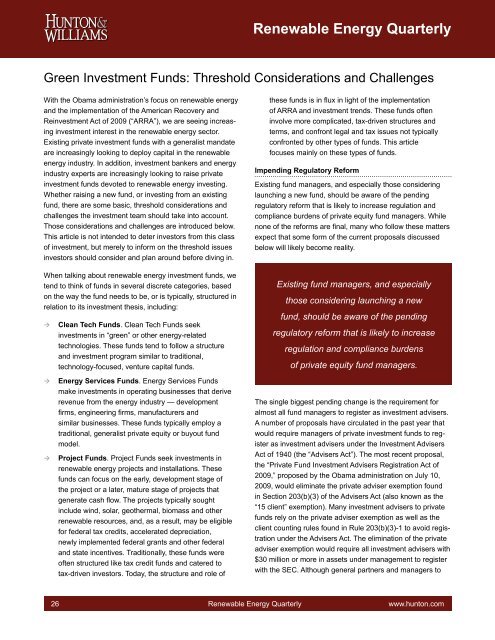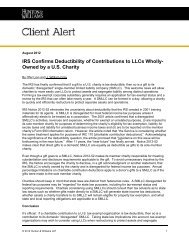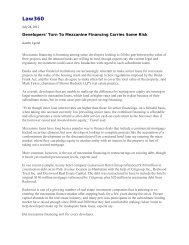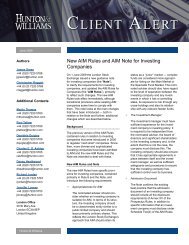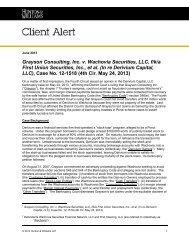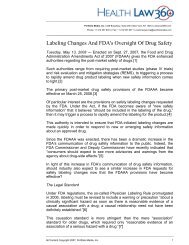Hunton & Williams Renewable Energy Quarterly, September 2009
Hunton & Williams Renewable Energy Quarterly, September 2009
Hunton & Williams Renewable Energy Quarterly, September 2009
Create successful ePaper yourself
Turn your PDF publications into a flip-book with our unique Google optimized e-Paper software.
<strong>Renewable</strong> <strong>Energy</strong> <strong>Quarterly</strong><br />
Green Investment Funds: Threshold Considerations and Challenges<br />
With the Obama administration’s focus on renewable energy<br />
and the implementation of the American Recovery and<br />
Reinvestment Act of <strong>2009</strong> (“ARRA”), we are seeing increasing<br />
investment interest in the renewable energy sector.<br />
Existing private investment funds with a generalist mandate<br />
are increasingly looking to deploy capital in the renewable<br />
energy industry. In addition, investment bankers and energy<br />
industry experts are increasingly looking to raise private<br />
investment funds devoted to renewable energy investing.<br />
Whether raising a new fund, or investing from an existing<br />
fund, there are some basic, threshold considerations and<br />
challenges the investment team should take into account.<br />
Those considerations and challenges are introduced below.<br />
This article is not intended to deter investors from this class<br />
of investment, but merely to inform on the threshold issues<br />
investors should consider and plan around before diving in.<br />
When talking about renewable energy investment funds, we<br />
tend to think of funds in several discrete categories, based<br />
on the way the fund needs to be, or is typically, structured in<br />
relation to its investment thesis, including:<br />
Æ Æ Clean Tech Funds. Clean Tech Funds seek<br />
investments in “green” or other energy-related<br />
technologies. These funds tend to follow a structure<br />
and investment program similar to traditional,<br />
technology-focused, venture capital funds.<br />
Æ Æ <strong>Energy</strong> Services Funds. <strong>Energy</strong> Services Funds<br />
make investments in operating businesses that derive<br />
revenue from the energy industry — development<br />
firms, engineering firms, manufacturers and<br />
similar businesses. These funds typically employ a<br />
traditional, generalist private equity or buyout fund<br />
model.<br />
Æ Æ Project Funds. Project Funds seek investments in<br />
renewable energy projects and installations. These<br />
funds can focus on the early, development stage of<br />
the project or a later, mature stage of projects that<br />
generate cash flow. The projects typically sought<br />
include wind, solar, geothermal, biomass and other<br />
renewable resources, and, as a result, may be eligible<br />
for federal tax credits, accelerated depreciation,<br />
newly implemented federal grants and other federal<br />
and state incentives. Traditionally, these funds were<br />
often structured like tax credit funds and catered to<br />
tax-driven investors. Today, the structure and role of<br />
these funds is in flux in light of the implementation<br />
of ARRA and investment trends. These funds often<br />
involve more complicated, tax-driven structures and<br />
terms, and confront legal and tax issues not typically<br />
confronted by other types of funds. This article<br />
focuses mainly on these types of funds.<br />
Impending Regulatory Reform<br />
Existing fund managers, and especially those considering<br />
launching a new fund, should be aware of the pending<br />
regulatory reform that is likely to increase regulation and<br />
compliance burdens of private equity fund managers. While<br />
none of the reforms are final, many who follow these matters<br />
expect that some form of the current proposals discussed<br />
below will likely become reality.<br />
Existing fund managers, and especially<br />
those considering launching a new<br />
fund, should be aware of the pending<br />
regulatory reform that is likely to increase<br />
regulation and compliance burdens<br />
of private equity fund managers.<br />
The single biggest pending change is the requirement for<br />
almost all fund managers to register as investment advisers.<br />
A number of proposals have circulated in the past year that<br />
would require managers of private investment funds to register<br />
as investment advisers under the Investment Advisers<br />
Act of 1940 (the “Advisers Act”). The most recent proposal,<br />
the “Private Fund Investment Advisers Registration Act of<br />
<strong>2009</strong>,” proposed by the Obama administration on July 10,<br />
<strong>2009</strong>, would eliminate the private adviser exemption found<br />
in Section 203(b)(3) of the Advisers Act (also known as the<br />
“15 client” exemption). Many investment advisers to private<br />
funds rely on the private adviser exemption as well as the<br />
client counting rules found in Rule 203(b)(3)-1 to avoid registration<br />
under the Advisers Act. The elimination of the private<br />
adviser exemption would require all investment advisers with<br />
$30 million or more in assets under management to register<br />
with the SEC. Although general partners and managers to<br />
26 <strong>Renewable</strong> <strong>Energy</strong> <strong>Quarterly</strong> www.hunton.com


